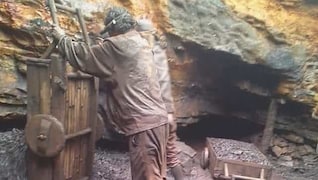In a distressing incident, a 24-year-old man named Naren Phukan, hailing from the Itakhuli area of Tinsukia’s Ledo, was discovered deceased on Wednesday evening inside a rat-hole coal mine in the Molo Pahar region of Assam’s Tinsukia district. The unfortunate demise sheds light on the dangers associated with rat-hole mining, an illegal and hazardous practice involving the extraction of coal through narrow tunnels.
The local police revealed that Phukan’s family received a tip-off from a concerned neighbor regarding his untimely death. The grieving mother expressed her shock, stating, “He told us that he works for businessman Kshitish Debnath, but we didn’t know that he was risking his life.”
Rat-hole mining, characterized by the excavation of cramped and shallow tunnels, poses significant risks to the workers involved. These tunnels, with depths of three to four feet, only allow enough space for a single person to enter and extract coal. The perilous working conditions and the constant threat of cave-ins make rat-hole mining a treacherous occupation.
Tragic Discovery: Assam Man, 24, Found Lifeless in Hazardous Rat-Hole Coal Mine
Attempts to reach Kshitish Debnath, the businessman supposedly employing Phukan, for a comment were unsuccessful, leaving unanswered questions regarding the circumstances surrounding the young man’s employment.
Sub-divisional Police Officer Hemanta Kumar Dey of Tinsukia acknowledged the family’s complaint and assured a thorough investigation into Phukan’s death. “The area is vast, and we are meticulously examining the matter,” Dey stated. Initial investigations suggest that the victim may have succumbed to the inhalation of poisonous gases present in the mine. The police have handed over the body and are awaiting the final autopsy report to ascertain the cause of death.
It is disheartening to note that despite a ban on rat-hole coal mining issued by the National Green Tribunal in April 2014, the practice continues unabated, with lax enforcement of the regulation. Local residents in Tinsukia, who have been witness to the grim repercussions of such mining activities, revealed that numerous individuals have lost their lives due to illegal mining operations in the Ledo area. An anonymous resident disclosed, “Rat-hole mines have sprouted in Margherita and Ledo. Coal smugglers are running an organized racket, recruiting youths from financially vulnerable families across various regions.”
Tragic Death Exposes Hazards of Rat-Hole Mining: Urgent Action Needed
Highlighting the urgency for a comprehensive investigation into these occurrences, it is worth noting that in September of the previous year, three workers met a tragic fate in a rat-hole mine in Ledo. Police authorities had promised a detailed inquiry into the incident. Another fatality was reported in January of this year, prompting the victim’s family to demand a thorough investigation into the circumstances surrounding the death.
When approached for comment regarding the prevalent issue of illegal mining in the district, the Tinsukia police declined to provide a statement. The reluctance to address the matter raises concerns about the challenges involved in combating this unlawful and perilous practice.
The unfortunate demise of Naren Phukan serves as a somber reminder of the inherent risks associated with rat-hole coal mining. The hazardous conditions endured by workers, coupled with the absence of stringent enforcement measures, continue to claim lives and leave families shattered. It is imperative for authorities to address the rampant issue of illegal mining, prioritize the safety and well-being of workers, and ensure strict adherence to regulatory measures. Such actions are vital in order to prevent further tragedies and protect the lives and livelihoods of individuals employed in the mining sector.
The plight of Naren Phukan, a young man who lost his life while toiling in the treacherous depths of a rat-hole coal mine, highlights the dire circumstances faced by many individuals engaged in this exploitative industry. Rat-hole mining has gained notoriety for its unregulated nature, making it a breeding ground for tragedy and exploitation.
The fact that Phukan’s family was unaware of the risks he faced while working in the coal mine is deeply troubling. It raises questions about the accountability of those responsible for employing workers in such hazardous conditions. Businessman Kshitish Debnath, who purportedly employed Phukan, should be held accountable for subjecting workers to life-threatening situations without adequate safeguards.
Furthermore, the perils of rat-hole mining are well-known, yet the authorities have been ineffective in curbing this illegal practice. The National Green Tribunal’s ban on rat-hole coal mining in 2014 was a step in the right direction, but its implementation remains lacking. The continued operation of these mines, despite the ban, points to the need for stricter enforcement measures and more significant penalties for those found guilty of violating the regulations.
The local residents of Tinsukia, who have witnessed the devastating consequences of illegal mining, have shed light on the extent of the problem. They speak of a widespread network of coal smugglers who exploit vulnerable individuals from financially disadvantaged backgrounds, enticing them into dangerous mining activities. This insidious operation not only perpetuates human exploitation but also contributes to the thriving black market for coal.
